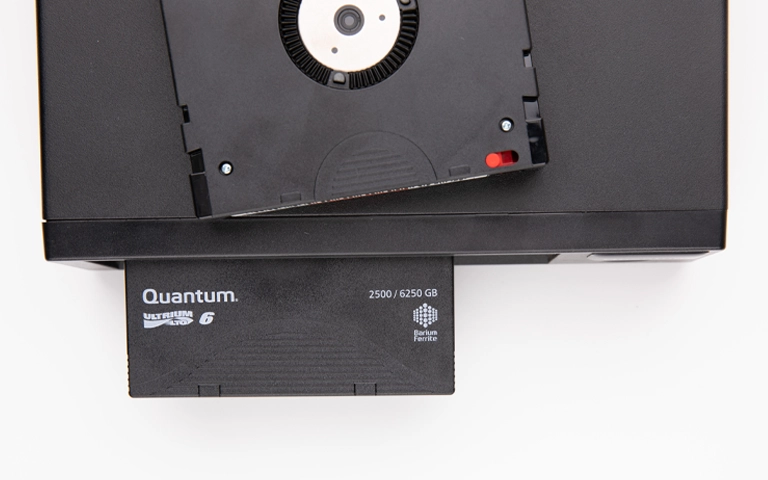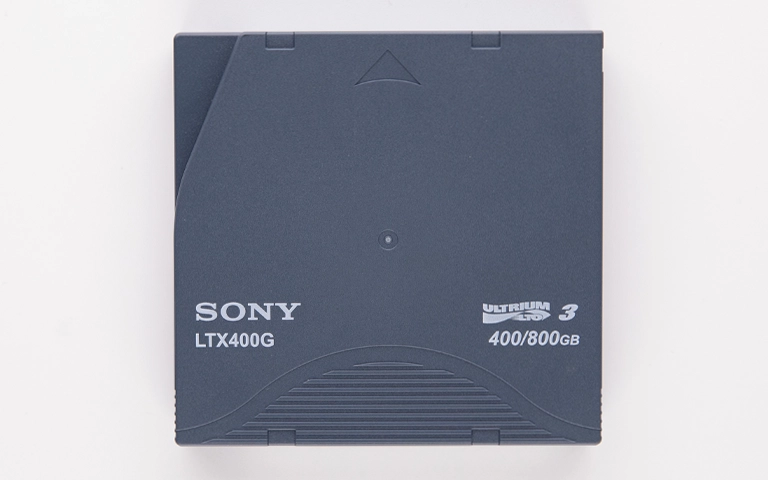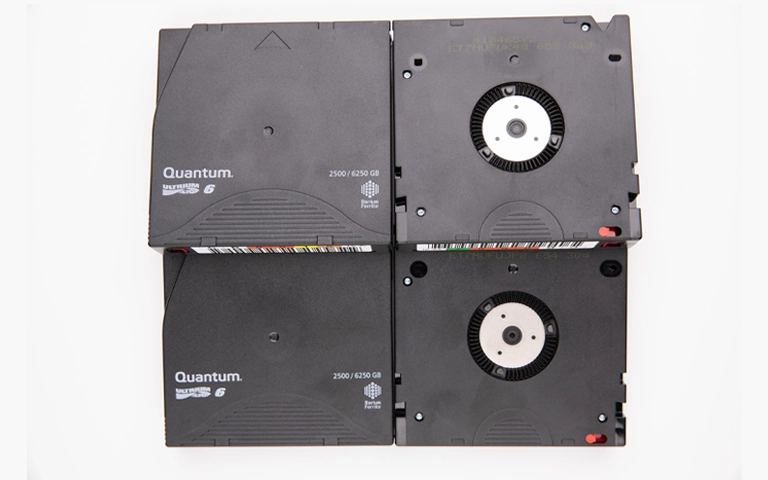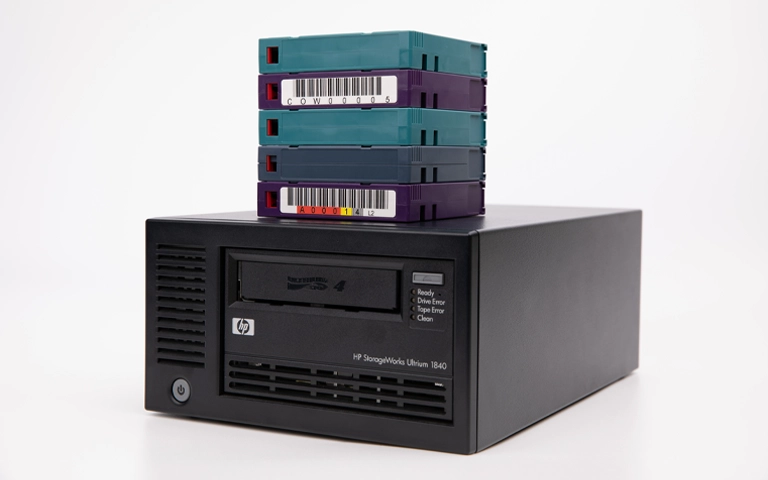In an era dominated by cloud platforms and SSD storage, it is easy to assume that tape technology is obsolete. Yet in many enterprise data centres and government archives, rows of tape backup systems are still quietly preserving terabytes of critical information.
So why are these decades old devices still in use today? From large scale data protection to long term archival storage, tape backup remains an essential component for organisations that prioritise reliability and data durability.
Below, we explore where tape drives are used and why their role in modern data management continues to grow.

What Is a Tape Drive and Why Does It Matter Today?
Tape drives have been in use for decades, yet they still play a crucial role in secure data storage and backup strategies. A tape drive uses magnetic tape to record and retrieve information, providing a reliable and cost effective method for archiving large volumes of data.
Even with the growth of cloud and disk based storage, many organisations continue to depend on tape backup for long term data retention. Tape offers exceptional stability, enabling businesses to preserve critical records for years without ongoing maintenance or high energy costs.
In this article, you will see how tape drives work, where tape backup is most commonly used, and why it remains a trusted choice for large scale data protection.
How Tape Drives Work
Tape drives use magnetic tape to store data in a linear sequence. Unlike hard drives that provide random access, tape backup systems write and read information in order, which makes them particularly suitable for large, continuous backups and long term archiving.
The storage media, typically housed in compact cartridges, passes over read and write heads that record data magnetically. This sequential design allows the drive to hold very large volumes of information while using minimal power.
Modern platforms, such as LTO tape backup technology, combine this proven approach with high capacity cartridges and fast transfer speeds.
As a result, tape backup remains a cost effective and energy efficient option for enterprise environments.

Common Applications Of Tape Drives In Businesses
Despite their age, tape drives still play a major role in enterprise data protection strategies. Their ability to handle large data volumes securely makes tape backup valuable in several key areas:
Data centres: Tape drives are often integrated into large scale backup platforms, ensuring critical information can be restored after hardware failures, human error, or cyber incidents.
Archival systems: Legal, healthcare, financial, and research organisations use tape to store records that must be retained for many years without alteration, helping to meet regulatory and compliance requirements.
Disaster recovery: Tape backup provides a secure offline copy that is isolated from the network. This helps protect against ransomware, accidental deletions, and system wide corruption.
Enterprise backup rotation: Businesses rely on tape libraries and autoloaders to manage routine backups efficiently while keeping long term storage costs under control.
In many organisations, tape backup for business remains one of the most dependable ways to safeguard sensitive data.
Tape systems also complement server and cloud backup environments, adding another layer of redundancy and long term preservation.
Industries That Rely On Tape Storage
While many organisations have moved further into cloud and disk based platforms, several sectors still depend heavily on tape backup for long term preservation and regulatory compliance.
These environments prioritise stability, predictable retention, and offline security that magnetic tape delivers with ease.
Government agencies: Use tape backup to store classified records, policy documents, and historical archives in a controlled, offline format.
Financial institutions: Retain transaction logs, client records, audit trails, and regulatory reports on tape so they remain secure and tamper resistant for years.
Research and education: Universities, observatories, and laboratories archive large datasets, experimental outputs, and historical research that must be preserved for future analysis.
Healthcare providers: Store patient files, diagnostic imaging, and treatment histories on tape to support long term record keeping and legal or clinical requirements.
Enterprises: Integrate tape backup with wider storage platforms to balance performance, capacity, and cost across on premise and cloud environments.
Across these sectors, reliability and long retention matter more than instant access, which is why tape backup remains a trusted method for large scale data archiving.

Why Businesses Still Trust Tape Drives
Tape drives continue to earn trust because they provide advantages that other storage technologies cannot fully replace. Their design focuses on endurance, affordability, and offline safety, which makes tape backup ideal for long term protection of critical information.
Key benefits include:
High capacity: Modern tape cartridges can hold multiple terabytes of data, allowing large datasets to be stored in a compact, efficient format.
Longevity: When stored and handled correctly, tapes can retain data for decades with minimal degradation, supporting strict retention and compliance requirements.
Energy efficiency: Tape backup uses no power while the cartridges are stored, helping data centres reduce running costs compared with always on disk systems.
Offline security: Because tapes are not permanently connected to the network, they are isolated from cyberattacks. This makes tape backup especially valuable for protection against ransomware and other threats.
These strengths explain why tape drives remain a core component of many modern hybrid backup strategies, combining durability, cost control, and robust long term data protection.
Fast turnaround times for business-critical data
Challenges of Tape Storage
Although tape drives offer clear benefits, they also present challenges that can limit their suitability in certain environments. One of the main drawbacks is access speed. Because tapes store data sequentially, retrieving a specific file can take noticeably longer than with disk based systems.
Physical degradation is another concern. Over time, tapes can wear or become damaged if they are not stored correctly. Environmental factors such as humidity, temperature, and magnetic interference can all affect readability and long term tape backup reliability.
Managing large tape libraries can also be complex and time consuming. Regular maintenance, accurate labelling, and consistent tracking are essential to avoid misplacement and data loss.
In many cases, businesses turn to specialists for cartridge based data recovery to restore critical information from ageing, damaged, or unreadable tape backup media.

When to Contact Tape Data Recovery Experts
Even with careful handling, tape backup media can still fail because of physical damage, ageing, or poor storage conditions. When this happens, trying to access or repair tapes without the proper tools can make the situation worse and may permanently destroy the data.
Professional engineers use specialist equipment to recover information from damaged or unreadable tapes. They can safely restore data from broken cartridges, stretched tape, or partially overwritten sections with a high level of accuracy.
If your organisation experiences tape corruption or cartridge failure, it is far safer to rely on dedicated tape drive recovery services.
At RAID Recovery Services, we work with all major tape formats and complex storage environments, helping ensure your archived data is recovered securely and efficiently.
Trust the experts with proven results
Frequently Asked Questions
What is the main purpose of a tape drive?
A tape drive is primarily used for long term data storage and backup. It uses magnetic tape to archive large volumes of information securely and cost effectively, which makes tape backup ideal for organisations that require reliable, offline data protection.
Why are tape drives still used today?
Tape drives remain in use because they offer excellent data retention, a low cost per terabyte, and strong offline protection from cyberattacks. Many enterprises rely on tape backup as part of a hybrid strategy to ensure secure, long term preservation of critical records.
Which industries benefit most from tape storage?
Government, financial services, healthcare, and research institutions commonly use tape backup. These sectors depend on long retention periods, strict compliance, and secure offline copies that cannot be altered or deleted accidentally.
What are the common causes of tape drive failure?
Failures often arise from worn or ageing tape media, poor storage conditions, magnetic interference, or physical cartridge wear. Mechanical problems inside the drive itself can also prevent tapes from reading or writing data correctly.
Can data be recovered from a damaged tape drive?
Yes. Professional recovery engineers can extract information from corrupted, physically damaged, or aged tapes using specialist tools and controlled processes. RAID Recovery Services provides secure tape backup recovery for all major tape formats and enterprise storage environments.